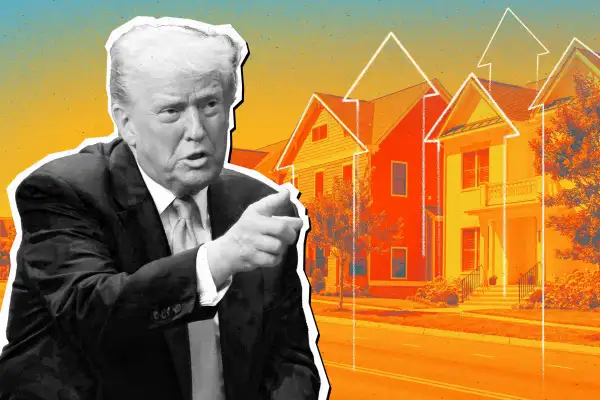Trump's 50-Year Mortgage Idea Is 'No Silver Bullet' for Housing Affordability

Could 50-year mortgages be the key to unlocking cheaper houses?
That's the debate among real estate experts after a Truth Social post by President Donald Trump floated the idea to improve housing affordability, especially for first-time buyers struggling with elevated mortgage rates and high home prices.
Most mortgages have 30-year terms. The goal of extending them by 20 years would be to lower monthly payments to a level accessible to more prospective homeowners — and to help jump-start the sluggish housing market.
On the surface, the idea of a 50-year mortgage may sound promising. But experts say longer mortgages may pose a greater risk to buyers in the long run. While lower monthly payments on a longer-term loan could certainly decrease Americans' overall monthly expenses and free up cash for other costs, a 50-year mortgage "is no silver bullet in terms of improving housing affordability," says Ken Sisson, associate broker at Coldwell Banker Realty in California.
The real impact of a 50-year mortgage on monthly payments
The main argument in favor of extending the repayment period is that it could lower people's monthly mortgage payments. Lower payments could make it easier for younger buyers to enter the market and benefit homeowners who could refinance.
For example, a 30-year, $400,000 fixed-rate loan at 6.22%, Freddie Mac's current national average, has a monthly payment of $2,455 (excluding taxes and insurance).
The same loan over 50 years at the same rate would have a payment of $2,171. That's a savings of nearly $300 every month.
However, those eye-popping numbers aren't likely to be real. Just as the interest rate on a 30-year mortgage is higher than that on a 15-year one, the rate on a 50-year mortgage is likely to be higher than that on a 30-year one.
No one knows how much higher the rate will be, but assuming a difference of 0.70 percentage points — which is the current gap between a 30- and 15-year mortgage — the monthly savings provided by a half-century-long mortgage are reduced to $79.
Even Trump has acknowledged that the savings from a 50-year mortgage might not be massive. Speaking on Fox News' The Ingraham Angle on Monday, the president said "it's not, like, a big factor," adding that "it might help a little bit."
Without a clear idea of exactly how much lower payments could get, there's doubt about how many prospective buyers would even be able to take advantage of a longer term. Joel Berner, senior economist at Realtor.com, says he believes that borrowers who are currently "on the margin" of being approved for a loan could benefit the most.
The hazards associated with such a long loan term, on the other hand, could affect a much larger group of borrowers.
The downsides of a 50-year mortgage
Experts say there are also risks involved in relying on an extended repayment period alone to address the problems facing buyers in today's market.
For example, a 50-year loan, according to Berner, doesn't address the lack of enough inventory to meet demand or help reduce home prices. In fact, Berner says he believes that if a large number of borrowers were to adopt this new loan term, the ensuing increase in demand actually could drive greater competition and send home prices higher.
"All [it] does is subsidize buyers, make it easier for them to … chase after the same number of homes on the market," Berner says. "That drives prices up, and all the savings go out the window."
Another concern has to do with homeownership's role in building long-term wealth through home equity.
An analysis by Realtor.com estimates that at the end of a 10-year term, a borrower with a 30-year mortgage would have paid down enough of the principal to accumulate a 24% equity stake in their home — enough to eliminate private mortgage insurance or to refinance the loan or apply for a home equity loan.
With a 50-year loan, that would drop to just 14%, significantly limiting someone's refinancing options.
By the same token, the increased interest rate and longer payback time mean a homeowner will end up paying a lot more interest over the full term of the loan. Some estimates even double the amount of total interest paid on a shorter loan.
Homeowners could also find themselves scrambling if home values start to drop. Because the principal on a 50-year loan would be paid off so slowly, a significant decrease in home values could leave the property underwater, or owing more than it's actually worth. This would leave the owner with very few options if they run into financial distress.
In the end, while the idea of a 50-year mortgage may seem like a potential solution to America's housing affordability crisis, Sisson notes that the word "savings" isn't quite the right one to associate with such a long-term loan.
Rather, he says, "The whole idea simply defers payment of the principal balance owed and, by doing so, costs significantly more in the way of interest paid."
More from Money:
Mortgage Rates Below 6%? Don't Hold Your Breath
1 in 5 Are Now Paying Mortgage Rates of 6% or More
Homebuyers Are Gaining More Purchasing Power as Mortgage Rates Fall






